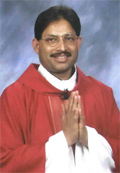|
LIFE AND DEATH IS A PART OF OUR LIFE.


Every year when I visit my home in Barkur I make sure I visit the
cemetery, located near my home parish, St. Peter the Apostle.
At
the entrance to the cemetery there is an arch with the words,
written in Konkani, “Samadanent Vishew Gevendit” (REST IN PEACE).
There I see the graves of wonderful people marked with crosses
that have been engraved with their dates of birth and death. Many
I knew very well because they were born and raised in our
beautiful town of
Barkur. Others came and lived in our historic town. As often as I
visit our cemetery I say a quiet prayer; “May the souls of these
faithful departed rest in peace with God.’
Sometimes during my vacation days in Barkur I am privileged to do
the funeral of a relative or parishioner whom I knew very well. In
doing so I am able to participate with the family in the grieving
process for their loved one. When I reflect deeply on this mystery
of life and death, I am fully convinced that it is just a part of
our daily living. Without knowing when and how our end will come,
each of us has to be ready for that day and hour. For Christians
and all other religions who believe in life after death, there is
a comforting thought and hope that our ancestors, who have gone
before us, are in a peaceful place in the presence of God our
creator. Someday we also will go from this world and join the
company of our ancestors in heaven. So the cemetery for us
Christians and other religions, who do the burial rite for the
dead, it is a final resting place. For the living it is a place to
visit, pay homage with flowers or lighted candles, and offer
prayers to our loved ones.
In
our universal Catholic Church there are special days every year
when we remember our beloved dead and those days are called the
feast of All Saints and All Souls, celebrated on November 1st
and 2nd .
The
separation of our ancestors from us at the time of death is always
painful. I know many people, feel strongly that ancestors,
especially those who have loved us and whom we love, do not simply
disappear. They somehow are with us, interested in how we are and
what we are doing. They want to guide and protect us in some way
and for example, communicate with us through dreams. This way of
thinking about our ancestors need not seem so strange. Hinduism,
Christianity and Islam all honor the dead. Their tombs are cared
for and some are considered holy or saints. We pray for their
assistance and feel they are with us, supporting us, and
interceding for us to God.
Our
ancestors do not disappear to some far away place. The idea they
are near their loved ones need not shock us. We can take it for
granted. If we truly believe this, we will take their separation
at the time of death more calmly, even joyfully. Every time we
celebrate the Eucharist we recall people who have gone before us
and think of them as though they were celebrating and praying with
us. Maybe if we were more open and welcoming, we would experience
their presence and nearness even more. Love, concern for, and
communicating do not disappear with death. The Spirit of God is
there providing the link and enabling the process of
communication, so to speak.
There is a saying: “no man is an island.” We are all networked in
various ways, even in ways unknown to us. We know this network
extends across the borderlines of death. How enriching if we can
experience this!
We
pray to the saints. How many of us pray to a parent, to a
relative, to a friend, or even a child whom we know is alive in
the Lord and interested in our well being? I know some people who
do! We need no ones authorization to do this. The love of our
ancestors, people close to us, will be with us always as we
continue to walk our journey of life in this world.
Let
us not be afraid to face death when it comes because we know we
will have a life to live forever in heaven.
Fr. Tony Andrade |



